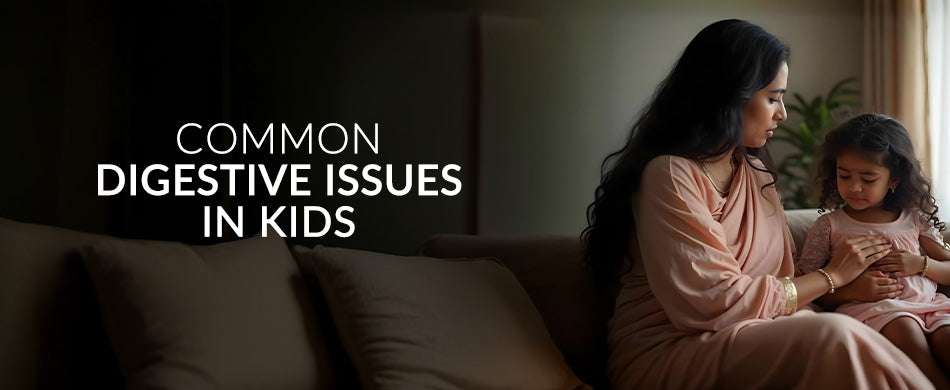Common Digestive Issues in Kids
- by Dr. Urvi Ashani

A healthy digestive system means a happy child. When digestion runs smoothly, your kid feels energized, has a good mood, and enjoys holistic wellness. But what about the days when their tiny tummies face common digestive issues? Whether it is indigestion, stomachache, gas, or vomiting - these problems can steal your baby’s smile.
So what to do? Fret not! This article discusses the most frequently occurring digestive problems in kids. We have also shared some amazing home remedies, including a natural tummy roll on, to bring instant relief to the little ones. Let’s start:
Common digestive problems in kids
The most frequently occurring digestive problems faced by your little ones are as follows:
Gastroesophageal Reflux Disease
Gastroesophageal Reflux Disease, or GERD, occurs when the acid and liquids present in the stomach flow back into the throat. This backward flow is commonly known as acid reflux and can cause severe discomfort in children.
There is a valve that separates our stomach and throat. However, this valve is weaker in kids than in adults, causing stomach acid and juices to travel up. If this condition continues to happen for a long time, it leads to GERD.
Symptoms of GERD:
- Burning sensation in the chest or throat, usually after eating or at night.
- A sour or bitter taste in the mouth.
- A feeling that food is stuck in the throat or chest.
- Persistent irritation can lead to a sore throat.
- Bad breath due to acid reflux and regurgitation.
Diarrhea
Diarrhea is one of the most common digestive issues in kids. It refers to a condition when a child has loose and watery bowel movements.
Depending on its duration, diarrhea usually has two different types. The first is acute, which lasts 1-2 days and is caused by consuming food or water contaminated by bacteria.
In the second type, diarrhea lasts for a few weeks, signalling a severe health problem. This type of diarrhea is a major symptom of diseases like ulcerative colitis, irritable bowel syndrome, and celiac.
Symptoms of Diarrhea:
- Nausea
- Belly pain
- Cramping
- Blood in stools
- Dehydration
- Fever
Visit a doctor immediately to prevent diarrhea symptoms from turning severe and causing more trouble to your little one.
Irritable Bowel Syndrome
Irritable Bowel Syndrome, or IBS, is a chronic disorder affecting the intestines. The condition doesn’t damage the tissues in your baby’s gastrointestinal tract or lead to severe health issues like colon cancer.
Symptoms of IBS:
- Abdominal pain and cramps
- Excessive gas buildup and bloating
- Diarrhea or constipation
- White-coloured mucus in the poop
- A feeling of heaviness in the stomach even after pooping
The best way to manage IBS is to change your child's diet. You can also encourage them to practice yoga or deep breathing to calm their stomachs. However, you must consult the doctor before changing your kid’s diet or adding new baby care products to their routine.
Inflammatory Bowel Disease
Inflammatory Bowel Disease, or IBD, is a collective term for disorders causing inflammation in different parts of the digestive tract. The two primary forms of IBD are Crohn’s disease and ulcerative colitis.
Per the reports, most kids have indeterminate colitis, which means that the doctor couldn’t confirm the IBD type. However, over time, it gets easy to diagnose the IBD form suffered by the child.
Symptoms of IBD
- Diarrhea, mostly with blood
- Blood in the stool
- Pain in the abdominal area
- Loss of appetite
- Weight loss
- Fever
- Vomiting
- Fatigue
Indigestion
Indigestion is another common stomach problem in children. The leading causes of indigestion are overeating, eating something that doesn’t suit the body, eating fast, stress, and munching at inappropriate times.
Children suffering from indigestion usually experience pain around the naval area and feel restless, and bloated. Releasing gas or passing stool can bring relief from pain. You can also try the given below methods to seek comfort:
- Do not overfeed your kids, especially at night.
- Limit spicy food, junk, and sugary drinks.
- Ensure your child eats slowly and chews well.
- Your child must take proper rest.
- They should have regular bowel movements.
For mild stomach pain, you can use a herbal baby tummy roll on. Usually, these roll ons are made using natural ingredients like hing to comfort digestive issues in kids.
Stomach Ulcers
Stomach ulcers are a common occurrence in toddlers. With a thin stomach lining, the little ones feel intense pain at the center of the belly button. Usually, leaving the stomach empty triggers the pain. Prolonged use of medicines like ibuprofen can cause stomach ulcers in kids.
Symptoms of Stomach Ulcer
- Intense pain under the breastbone
- Nausea
- Vomiting
- Dark-coloured stools
- Loss of appetite
- Bloating
Consult a doctor quickly if you see these symptoms in your child.
Stomach Flu
Gastroenteritis, commonly called stomach flu, is a viral infection causing inflammation in the intestines. It happens when viruses, bacteria, or parasites attack the stomach or intestines of kids. Generally, stomach flu in kids is caused by viruses such as rotavirus. The stomach flu stays for 2-3 days with symptoms like:
- Watery diarrhea
- Stomach pain
- Vomiting
- Fever (may or may not come)
- Crankiness and crying
A mild stomach flu recedes on its own in due time. The most common treatments for stomach flu include ORS for dehydration, medicine for severe diarrhea, a light and easy-to-digest diet, and plenty of water.
Food Allergies
Sometimes, an allergy to certain food items can cause stomach pain in kids. The best way to diagnose a food allergy is to pay attention to your child’s eating habits. Do not ignore their complaints of stomach pain or vomiting after consuming a particular food item. Your kid can be allergic to vegetables, nuts, fruit, dairy products, lentils, spices, etc.
Always keep a hing roll on in your baby care products box to relieve stomach pain, indigestion, or even colic pain. However, in case of severe pain, reach out for a doctor’s help immediately.
Symptoms of Food Allergies
- Diarrhea
- Itching on the skin
- Mental fog
- Vomiting
- Lack of growth
5 Signs of a healthy digestive system
A healthy digestive system is vital to good health and wellness for your kid. To ensure that your child has a healthy gut, check the following signs:
- Regular and pain-free bowel movements
- No stomach discomfort like constipation or diarrhea
- Healthy appetite with no urge to eat frequently
- Improved nutrient absorption and growth
- Clear and glowing skin
Best home remedies for digestive problems in kids
Your child is likely to experience stomach problems more often than you would like. The best resort to their impromptu gut troubles can be the home remedies given below:
Ginger Water: The Gingerol compound present in ginger root improves food movement through the digestive system. Moreover, ginger helps relieve gas, slows bowel movement in diarrhea, kills diarrhea-causing germs, and soothes an upset stomach.
Prepare this drink by brewing a few slices of ginger in water. Let it cool, strain, and serve in small quantities to the child. Or you can pick a natural tummy roll on from the market that contains ginger, hing, fennel, etc.
Trust me, it is the best addition to your baby wellness products kit. Thanks to the roll-on design, you get a complete mess-free application anytime and anywhere.
Bananas: Bananas have pectin, which absorbs excess liquid in the intestines and helps produce firmer stools during diarrhea. Moreover, in diarrhea, the body loses electrolytes. Now, bananas are rich in potassium, an electrolyte. So, eating a banana helps replenish the lost electrolytes in the body.
You can give your kid a banana to eat. Or prepare a banana smoothie for a tastier alternative.
Coconut Water: Coconut water is rich in electrolytes. It can be an excellent solution for rehydrating the body or comforting an upset stomach.
Ensure you offer your child fresh coconut water in small sips throughout the day. Avoid using packaged coconut water as it is likely to contain high sugar.
Hing: Hing or asafoetida is an age-old remedy to relieve stomach pain in kids. It helps release gas and gives quick comfort.
Take a small quantity of hing and add water to create a thick paste. Apply this paste to your kid’s naval area. You can also buy an Ayurvedic hing roll on from the market to comfort kids with indigestion, gas troubles, stomachache, etc.
Warm compress: A warm compress in the abdominal region can relax the muscles and relieve gas or cramps. You can take a mildly hot heating pad or towel and place it on your child’s naval area for 10-15 minutes to relieve the pain.
Yogurt: Yogurt is rich in probiotics, which help restore the natural balance of good bacteria in the stomach. It promotes digestion.
Wrapping up
Every parent gives their best to ensure good health and care for their kids. However, problems like stomach issues will likely bother the little ones now and then. Knowing about these digestive problems and effective home remedies can help relieve your child.
The home remedies mentioned here are simple and easy to blend into your kid’s life, as they are all natural and infused with Ayurvedic goodness. The next time you buy baby care products for your kid, don’t forget to add a good quality hing tummy roll on to your list.
Did you like these tips? Keep following us for more insightful child healthcare and wellness guides





